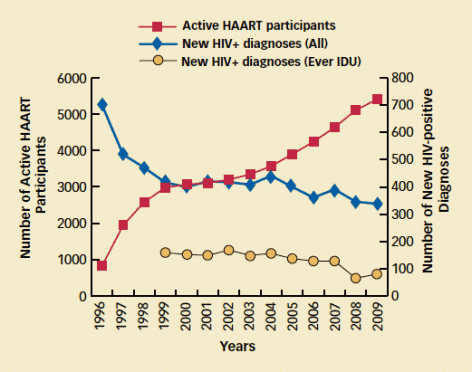Antiretroviral Treatment Reduces Spread of HIV Among Injection Drug Users
Dates
2009
2008
Tags
Drug Topics
Drugs of Abuse
Population Groups
Related Topics
Highly active antiretroviral therapy (HAART) not only benefits the health of individuals with HIV and a history of injection drug use but also reduces transmission of the virus to others in the community. Using province-wide data from British Columbia from 1996 to 2009, NIDA-funded researchers found a strong association between more extensive treatment with HAART and reductions in new HIV diagnoses per year, as well as decreased viral load in patients.
During the study period, as the province expanded HAART coverage more than five-fold as part of its universal health care program, new HIV diagnoses decreased about 50 percent, says lead investigator Dr. Julio Montaner of the British Columbia Centre for Excellence in HIV/AIDS in Canada. The increase in the number of people receiving HAART during the last 5 years of the study was accompanied by a greater decrease in new HIV cases among those with histories of illicit injection drug use than among those with no such history.
The researchers conclude that HAART treatment, which has already been demonstrated to dramatically reduce mother-to-child and sexual transmission of HIV, also markedly reduces HIV transmission among people who have a history of illicit injection drug use. In prior research, the team found that mortality rates from HIV after receiving HAART were comparable among people who used illicit injection drugs and those who did not (see “Study Gives Green Light to Antiretroviral Medications for HIV-Infected Injection Drug Users”).
 Treatment Expansion Parallels Drop In New HIV Cases Among Injection Drug Users As British Columbia extended highly active antiretroviral therapy (HAART), the number of new HIV diagnoses fell. A reduction was seen among individuals who had a history of illicit injection drug use (IDU) as well as in the general population.
Treatment Expansion Parallels Drop In New HIV Cases Among Injection Drug Users As British Columbia extended highly active antiretroviral therapy (HAART), the number of new HIV diagnoses fell. A reduction was seen among individuals who had a history of illicit injection drug use (IDU) as well as in the general population.The Lancet 376(9740):532–539, 2010. Full Text Available (PDF,1.7MB)
This page was last updated April 2012.
 External link, please review our disclaimer.
External link, please review our disclaimer.  External link, please review our disclaimer.
External link, please review our disclaimer.  External link, please review our disclaimer.
External link, please review our disclaimer.  External link, please review our disclaimer.External link, please review our disclaimer.
External link, please review our disclaimer.External link, please review our disclaimer. 




